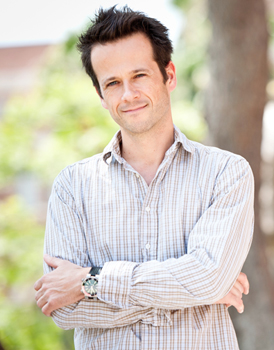
Emmanuel Debono
USC Shoah Foundation’s work in France is led by historian Emmanuel Debono, who says it’s exciting to be involved in such a worldwide effort to teach and preserve history.
Debono’s research focuses on anti-racism (read his blog in Le Monde), and he currently works at the French Institute for Education at the Ecole Normale Supérieure de Lyon, which became the 51st full-access Visual History Archive site and the first such site in France in Nov. 2014. His mission is to organize projects and reflection around the questions of memories and education. He joined the staff of the USC Shoah Foundation in 2009 as its French consultant.
Since then, Debono has worked to connect the Institute with partners in France who can use the testimonies in the Visual History Archive, such as national education organizations, teachers, memorials and museums. The first French teacher training, which included IWitness training, was held in December in Lyon. For the past two years, USC Shoah Foundation has produced an online exhibit of French testimony clips for France’s National Contest on Resistance and Deportation. Students may watch the clips and use them for inspiration, research, or assets in their written or audiovisual projects. The clips are taken from French-language testimonies of Holocaust survivors, resistance fighters and witnesses. Each clip is accompanied by biographical information about the interviewee.
Debono also works with anyone interested in using testimonies or testimony clips in France for films, educational products, or research projects. Recent partnerships have also produced exhibits for UNESCO and the Territories and Trajectories of Jews Deported from France project (TETRADE).
He said one of his most memorable moments was the first time he met the Shoah Foundation staff in Los Angeles in February 2010 and spent a week learning about the organization and its different departments.
“It was a new universe for me with incredible potentialities. In my professional experience, it was really a shock because it really enlarged my horizons,” Debono said. “I must say that I keep being astonished by the energy and the efficiency of each member of the USC Shoah Foundation, and of the team globally. It's so stimulating to see such a will to develop projects and to make them happen so fast.”
In addition, he said, “each time we set online a new exhibit, it's for me a memorable moment. It's a pleasure to see things being achieved and to have the feeling that you help the comprehension of history and memory.”
A challenge of working in France is making the USC Shoah Foundation stand out amid the many projects that already exist to memorialize the Holocaust and combat antisemitism. But he believes the Visual History Archive is uniquely positioned to contribute to education.
“With the collections of the Foundation, we really can bring digital and innovating solutions and be a serious partner for national education,” he said.
Debono hopes to organize a research cluster in his university with seminars, trainings for teachers and specific projects on World War II resistance and persecution with memorial site partners in Lyon.